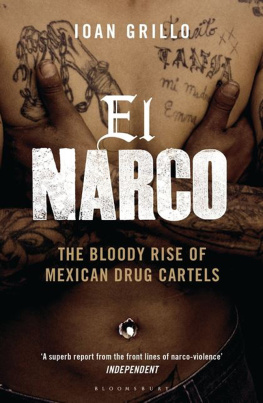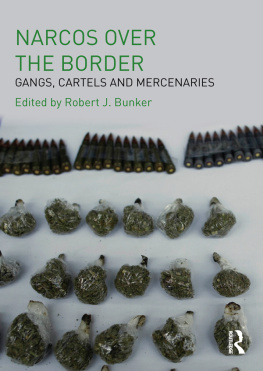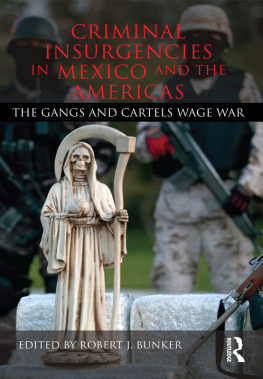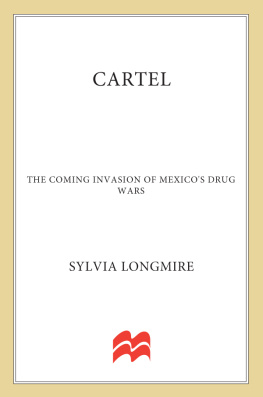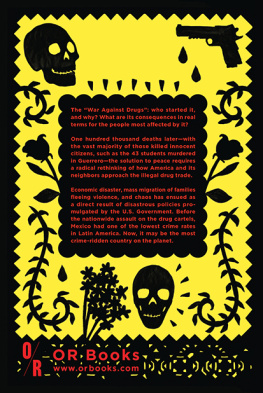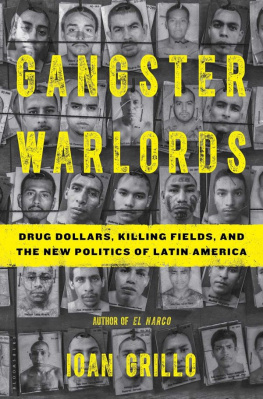Praise for El Narco
Riveting, authoritative reporting from the front lines of the Mexican drug wars Dan Rather
The strength of El Narco lies in its shoe-leather reporting; Grillo interviews everyone from a former cartel assassin to DEA agents to grieving families, snitches, pot and poppy farmers, illegal immigrants and gangbangers... Writers this knowledgeable about the subject and with no particular ax to grind are rare Salon.com
Heartbreaking... El Narco is a fine work of journalism Irish Times
Its hard enough to report the facts of Mexicos crazy death spiral of drug violence. Ioan Grillo goes much, much deeper. He explains why El Narco threatens the soul of this beautiful country. He tell us how we got here Washington Post
Remarkable Houston Chronicle
Spellbinding... Grillo drills down to the hidden contours of an industry that never sleeps Canberra Times
Reads like fiction Sunday Herald Sun
A compelling record of the most bloody of businesses Irish Examiner
Puts a human face on the bloodshed Boston Globe
In limpid prose and penetrating analysis Ioan Grillo puts a human face on the violent tragedy caused by U.S. drug demand and Mexican cartel criminality... I strongly recommend this timely and troubling book Howard Campbell, author of Drug War Zone
A Note on the Author
Ioan Grillo has reported on Latin America since 2001 for international media, including Time magazine, CNN, the Associated Press, PBS News-Hour, the Houston Chronicle, CBC, and the Sunday Telegraph. He has covered military operations, mafia killings, and cocaine seizures, and has discussed the drug war with two Mexican presidents, three attorneys general, and the U.S. ambassador. A native of England, he lives in Mexico City. El Narco was his first book. His most recent book was Gangster Warlords.

Bloomsbury Paperbacks
An imprint of Bloomsbury Publishing Plc
50 Bedford Square | 1385 Broadway |
London | New York |
WC1B 3DP | NY 10018 |
UK | USA |
www.bloomsbury.com
BLOOMSBURY and the Diana logo are trademarks of Bloomsbury Publishing Plc
First published in Great Britain 2011
This electronic edition first published in 2017
Ioan Grillo, 2011
Ioan Grillo has asserted his right under the Copyright, Designs and Patents Act, 1988, to be identified as Author of this work.
Every reasonable effort has been made to trace copyright holders of material reproduced in this book, but if any have been inadvertently overlooked the publishers would be glad to hear from them.
All rights reserved.
No part of this publication may be reproduced or transmitted in any form or by any means, electronic or mechanical, including photocopying, recording, or any information storage or retrieval system, without prior permission in writing from the publishers.
No responsibility for loss caused to any individual or organization acting on or refraining from action as a result of the material in this publication can be accepted by Bloomsbury or the author.
British Library Cataloguing-in-Publication Data
A catalogue record for this book is available from the British Library.
ISBN: PB: 978-1-4088-8946-6
ePub: 978-1-4088-2455-9
To find out more about our authors and books visit www.bloomsbury.com. Here you will find extracts, author interviews, details of forthcoming events and the option to sign up for our newsletters.
Contents

(Tim McGovern)
It all seemed like a bad dream.
It may have been vivid and raw. But it felt somehow surreal, as if Gonzalo were watching these terrible acts from above. As if it were someone else who had firefights with ski-masked federal police in broad daylight. Someone else who stormed into homes and dragged away men from crying wives and mothers. Someone else who duct-taped victims to chairs and starved and beat them for days. Someone else who clasped a machete and began to hack off their craniums while they were still living.
But it was all real.
He was a different man when he did those things, Gonzalo tells me. He had smoked crack cocaine and drunk whiskey every day, had enjoyed power in a country where the poor are so powerless, had a latest-model truck and could pay for houses in cash, had four wives and children scattered all over... had no God.
In those days, I had no fear. I felt nothing. I had no compassion for anybody, he says, speaking slowly, swallowing some words.
His voice is high and nasal after police smashed his teeth out until he confessed. His face betrays little emotion. I cant take in the gravity of what he is sayinguntil I play back a video of the interview later and transcribe his words. Then as I wallow over the things he told me, I pause and shudder inside.
I talk to Gonzalo in a prison cell he shares with eight others on a sunny Tuesday morning in Ciudad Jurez, the most murderous city on the planet. We are less than seven miles from the United States and the Rio Grande, which slices through North America like a line dividing a palm. Gonzalo sits on his bed in the corner clasping his hands together on his lap. He wears a simple white Tshirt that reveals a protruding belly under broad shoulders and bulging muscles that he built as a teenage American football star and are still in shape at his age thirty-eight. Standing six feet two, he cuts an imposing figure and exhibits an air of authority over his cellmates. But as he talks to me, he is modest and forthcoming. He wears a goatee, gray hairs on his chin below a curved, black mustache. His eyes are focused and intense, looking ruthless and intimidating but also revealing an inner pain.
Gonzalo spent seventeen years working as a soldier, kidnapper, and murderer for Mexican drug gangs. In that time he took the lives of many, many more people than he can count. In most countries, he would be viewed as a dangerous serial killer and locked up in a top-security prison. But Mexico today has thousands of serial murderers. Overwhelmed jails have themselves become scenes of bloody massacres: twenty slain in one riot; twenty-one murdered in another; twenty-three in yet anotherall in penitentiaries close to this same cursed border.
Within these sanguine pens, we are in a kind of sanctuaryan entire wing of born-again Christians. This is the realm of Jesus, they tell me, a place where they abide by laws of their own ecclesiastical government. Other wings in this jail are segregated between gangs: one controlled by the Barrio Azteca, which works for the Jurez Cartel; another controlled by their sworn enemies, the Artist Assassins, who murder for the Sinaloa Cartel.
The three hundred Christians try to live outside this war. Baptized Libres en Cristo, or Free Through Christ, the sect founded in the prison borrows some of the radical and rowdy elements of Southern American evangelicalism to save these souls. I visit a jail block mass before I sit down with Gonzalo. The pastor, a convicted drug trafficker, mixes stories of ancient Jerusalem with his hard-core street experiences, using slang and addressing the flock as the homeys from the barrio. A live band blends rock, rap, and

